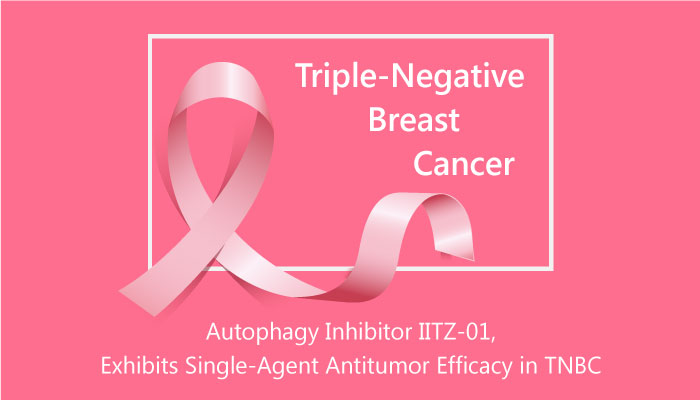Triple-negative breast cancer (TNBC) lacks the expression of estrogen receptor (ER) and progesterone receptor (PR). Moreover, human epidermal growth factor receptor overexpression is also absent. The morbidity of TNBC accounts for ~15% of all breast cancers patients. Unfortunately, compared with other breast cancer types, this type of breast cancer strongly relates to the shorter time of relapses. So for now, chemotherapy remains as the only viable option for the treatment.
Autophagy induction is a common phenomenon in various kinds of tumors including TNBC. It induces tumor cells resistant to multiple chemotherapy drugs and radiation. Thus, autophagy inhibition becomes a promising therapeutic method in treating TNBC and other cancers. Lysosomotropic compounds selectively exhibit notable properties of perturbation of autophagy process. Chloroquine (CQ) and Hydroxychloroquine (HCQ) display superior anti-cancer activity in numerous types of cancers. In spite of that, this method still could not reach the ideal goal in patients with the maximum tolerated dose of HCQ. Hence, more potent autophagy inhibitors are urgently needed for successful targeting of autophagy.

A study from Lalita Guntuku, et al, reported a novel potent lysosomotropic autophagy inhibitor– IITZ-01. IITZ-01 has single-agent antitumor activity, with an IC50 of 2.62 μM for PI3Kγ. In the study, time-course immunoblotting experiment with IITZ-01-treated cells displayed significant elevation in SQSTM1 levels. In addition to that, the inhibitor has demonstrated potent autophagy inhibitory activity in other breast, lung, and colon cancer cells. In animal models, it significantly inhibited tumor growth from third day of treatment.
Furthermore, this novel active chemical enhances autophagosome accumulation but inhibit autophagosomal degradation, finally resulting in the inhibition of autophagy. Interestingly, IITZ-01 exhibits more potent autophagy inhibition along with less cytotoxic action than CQ. Overall, it awaits further preclinical development as potential anticancer therapeutic.